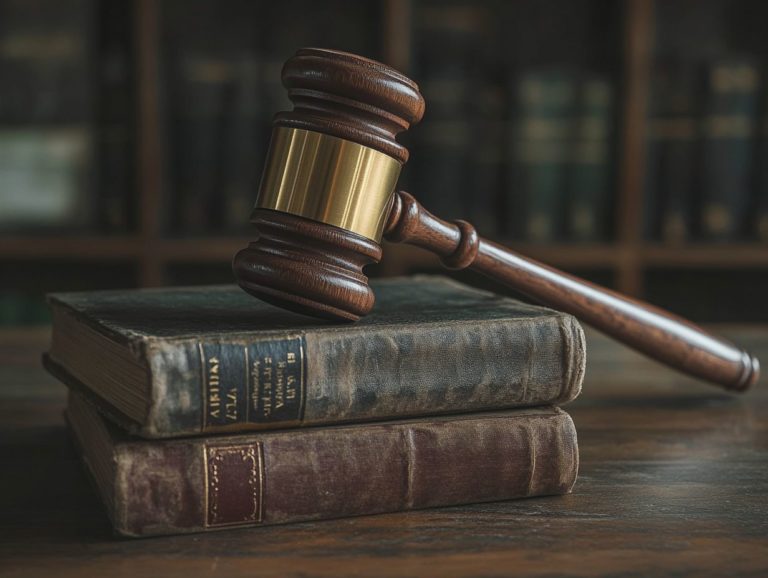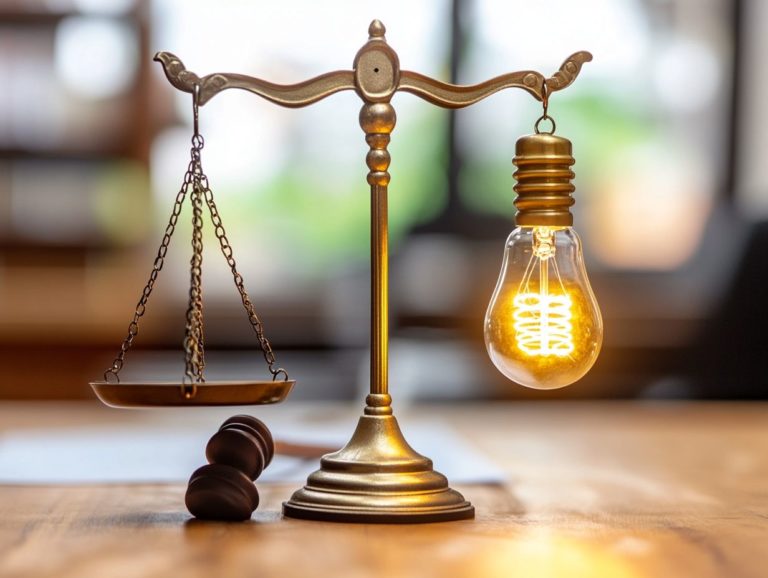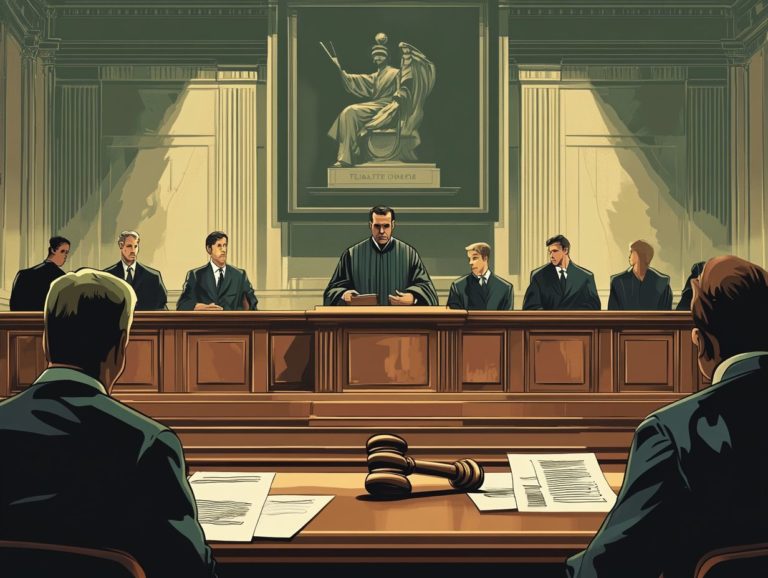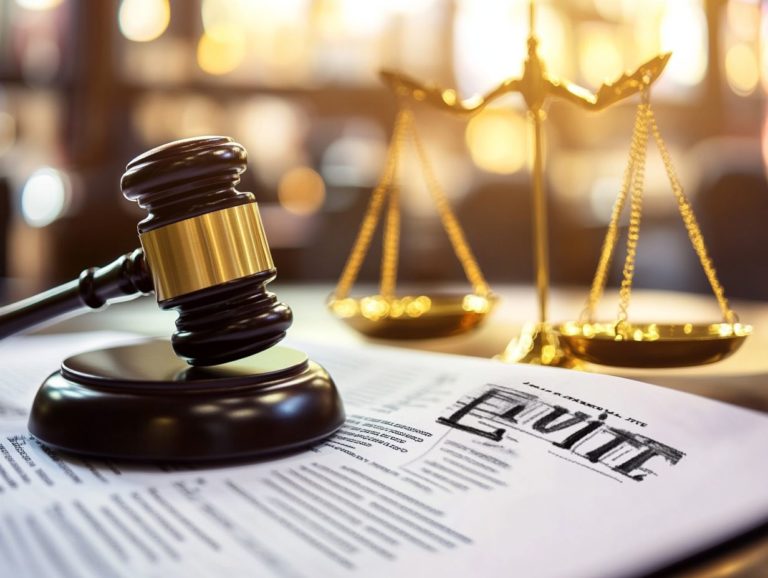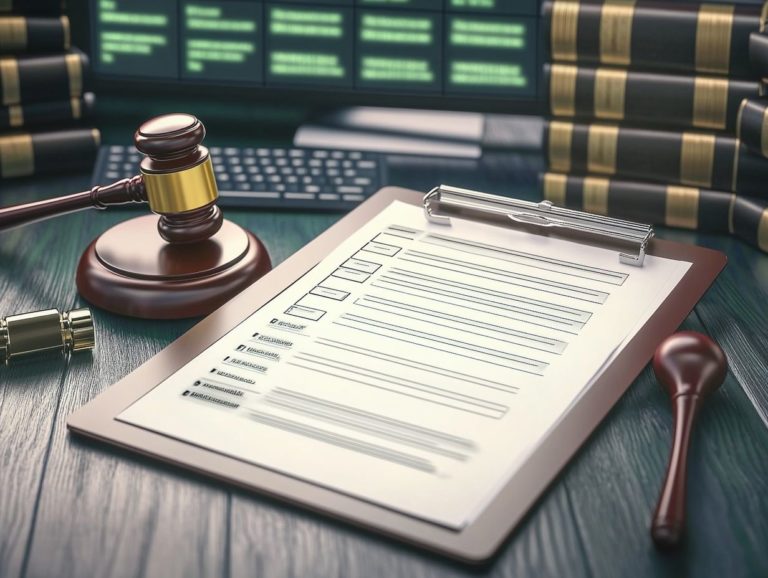How to Build a Case in IP Litigation
Intellectual property (IP) litigation is a vital pillar in safeguarding your creative assets in today s competitive arena. As innovation grows, protecting your ideas and inventions is crucial. Infringement risks are increasing.
This article explores what it takes to build a strong IP case. You ll learn about gathering compelling evidence, enlisting expert witnesses, and crafting persuasive arguments for the courtroom.
It also examines settlement options and outlines crucial steps to take before trial, ensuring that you are thoroughly prepared for any legal challenges that may arise.
Contents
- Key Takeaways:
- Understanding IP Litigation
- Elements of a Strong Case
- Gathering Evidence
- Expert Witnesses and Testimony
- Presenting Your Case in Court
- Effective Strategies for Presenting Your Case
- Settlement Options
- Preparing for Trial
- Frequently Asked Questions
- What is IP litigation and why is it important to build a strong case?
- What are the first steps to building a case in IP litigation?
- How can I gather evidence for my case?
- What role do experts play in building an IP litigation case?
- How important is it to have strong legal representation in IP litigation?
- What are some key factors to consider when building a case in IP litigation?
Key Takeaways:

Understand the basics of IP litigation and what constitutes a strong case. Collect relevant evidence and utilize expert witnesses to strengthen your case. For a comprehensive approach, learn how to prepare for an IP litigation case. Be prepared for court by strategizing your presentation and considering settlement options before trial.
Understanding IP Litigation
Understanding IP litigation requires a clear understanding of the legal frameworks that protect intellectual property (IP) rights, including patents, trademarks, and how to navigate patent litigation.
As the global economy relies more on these invaluable assets, effective litigation strategies become increasingly important for IP holders like you who need to defend against unauthorized use.
The costs associated with litigation and the complexities of the process of legally obtaining a patent and copyright infringement claims highlight the need for expertise in navigating through the litigation process.
Key players in this arena include federal courts and specialized entities such as the U.S. Patent and Trademark Office, which shape the competitive landscape of IP law.
What is Intellectual Property (IP) Litigation?
Intellectual Property (IP) litigation encompasses the legal processes of contesting and enforcing your IP rights, such as patents, copyrights, trademarks, and trade secrets in the face of infringement. This area of law is essential for protecting the innovations and creative expressions that shape various industries, from technology to entertainment.
IP litigation acts as your safeguard, allowing you to assert ownership over your ideas and developments. For example, patent disputes often arise in the tech sector over software innovations, while copyright litigation frequently surfaces in the music and publishing industries due to unauthorized use of artistic works.
Trademark cases further highlight the importance of brand protection, seen in lawsuits that defend iconic logos and product names factors that ultimately impact your company s market position and economic viability.
Elements of a Strong Case
Building a robust case in IP litigation relies on several crucial factors that can significantly influence the outcome, particularly in patent and trade secret disputes. To navigate this complex landscape, consider learning how to develop a winning IP litigation strategy.
It’s essential for IP holders like you to understand the elements that create a compelling argument while navigating the intricate landscape of legal protections and pursuing damages for infringement claims.
The combination of comprehensive evidence, expert witness testimonies, and a well-crafted litigation strategy is crucial for success in any IP dispute. For more insights, check out how to handle IP litigation in different jurisdictions.
Key Factors for Building a Strong Case
Several key factors play a critical role in building a strong case for IP litigation, including the strategic collection of evidence and understanding how to conduct a successful IP litigation trial with the selection of the right expert witness.
You must conduct a thorough analysis of your unique situation to identify the strengths and weaknesses of your case.
Choosing appropriate legal strategies tailored to the specifics of your dispute can significantly impact the overall outcome. An adept legal team understands that effectively presenting evidence in court not only supports your claims but also influences how the judge and jury perceive your case.
These elements can lead to more favorable damages awarded, highlighting the necessity of meticulous preparation throughout the litigation process.
Gathering Evidence

Gathering evidence is an essential step in the IP litigation process. It forms the bedrock for establishing the validity of your IP rights and demonstrating infringement.
The types of evidence you need can vary considerably depending on your case specifics, whether it pertains to patent litigation, trademark dilution, or trade secret disputes.
Engaging in thorough document discovery and collecting pertinent data is vital. This helps construct a compelling narrative that strengthens your claims and facilitates the litigation process.
Types of Evidence to Collect
In IP litigation, various types of evidence can strengthen your case. These include digital evidence, documents, and expert witness testimonies.
Digital evidence like emails, software code, and online communications provides a solid trail of intent and usage. This makes your case all the more compelling.
Documents like patents, license agreements, and correspondence lay the groundwork that clearly establishes your rights and obligations.
Expert witness testimonies are also essential. These specialists can explain complex technical aspects and validate your claims about the originality and usage of intellectual property.
Their authoritative insights help judges and juries understand better, ultimately enhancing your case s credibility.
Expert Witnesses and Testimony
Expert witnesses hold a crucial position in IP litigation. They bring specialized knowledge and testimony that can greatly influence the case’s outcome.
Their insights clarify complex matters concerning legal rights, economic value, and the intricate technologies involved in patent disputes or copyright infringement claims.
Choosing the right expert witness can make or break your case! This choice lends the necessary credibility to bolster your position in court.
The Role of Expert Witnesses in IP Litigation
In IP litigation, expert witnesses play a pivotal role. They offer authoritative testimony that clarifies complex issues and substantiates infringement claims.
These experts, often esteemed leaders in their fields, evaluate patent validity and provide opinions on how a product or process aligns with established criteria.
By doing so, they enhance the credibility of your arguments and shape the narrative of the case. Their insights can significantly influence your litigation strategy.
Presenting Your Case in Court
Effectively presenting your case in court requires a meticulously crafted strategy. This strategy should actively engage the jury while clearly articulating the legal rights involved in your IP dispute, including understanding the importance of case law in IP litigation.
Your success hinges on showcasing the strength of your evidence and the legitimacy of your claims, whether they pertain to patent infringement or trade secret violations.
A deep understanding of court decisions and the judicial process will guide you in conveying your arguments persuasively. Act now to ensure your evidence shines in court!
Effective Strategies for Presenting Your Case

Implementing effective strategies for presenting your case in the courtroom can significantly boost your chances of achieving a favorable outcome in IP litigation. Additionally, understanding how to prepare an IP litigation budget can further enhance your approach. By leveraging visual aids, such as charts and diagrams, you can clarify complex information and capture the jury’s attention efficiently.
Integrating expert testimonies enhances your credibility, helping judges and jurors comprehend the technicalities that may underpin your case. A compelling opening statement outlines the facts and evokes emotions, framing the narrative in a way that resonates. Meanwhile, a well-crafted closing statement reinforces your key points and leaves a lasting impression.
Understanding the courtroom setting is crucial. Recognizing its nuances allows you to adapt effectively during the litigation process, ensuring that your arguments resonate and maintain focus throughout the trial.
Settlement Options
Settlement options are a crucial aspect of IP litigation that you must consider. They provide alternative pathways to trial, potentially saving you both time and significant litigation costs.
By grasping the intricacies of negotiation and dispute resolution, you can achieve favorable outcomes without the hassle of protracted courtroom battles. Various strategies are available to facilitate amicable agreements, allowing you to navigate the complexities of the process with confidence.
Alternative Options to Going to Trial
Exploring alternative options to going to trial, such as mediation and arbitration, offers valuable pathways for resolving IP disputes efficiently and effectively.
These methods streamline the resolution process and promote a more collaborative atmosphere where meaningful dialogue can occur, potentially preserving vital professional relationships.
In mediation, an impartial facilitator guides discussions, allowing both parties to express their concerns and work towards a mutually beneficial agreement. Conversely, arbitration involves a neutral third party who makes binding decisions, significantly cutting down on the time and costs associated with lengthy court battles.
By adopting a well-crafted settlement strategy, you can navigate these alternatives to achieve quicker and less expensive outcomes, ultimately leading to a more satisfactory resolution for everyone involved.
Preparing for Trial
Preparing for trial is a multifaceted endeavor that requires careful attention to several crucial steps, all aimed at ensuring a compelling presentation in court during IP litigation.
From meticulously gathering and reviewing evidence to enlisting expert witnesses, thorough preparation is vital for successfully navigating the complexities of the litigation process. Each phase witness preparation, strategy development, and more holds significant weight in shaping the ultimate outcome of your trial.
Important Steps to Take Before Trial
Before you step into the courtroom, there are crucial steps to ensure you’re fully prepared and effective in presenting your IP case. Preparation is not just a task; it’s the backbone of your trial, and knowing how to leverage technology for IP litigation can significantly enhance your strategy.
Finalize your evidence with careful analysis of documents and secure expert testimony to craft a compelling narrative. Preparing witness testimonies involves extensive rehearsals to ensure clarity and confidence. A strong witness can be a game-changer in swaying the jury’s opinion.
Honing your litigation strategies is vital. You must be ready to counter opposing arguments while remaining adaptable to any twists and turns during the trial.
These meticulous preparations can be the difference between winning and losing your case! Ultimately, they significantly enhance your chances of achieving a favorable outcome, underscoring the critical importance of being well-prepared.
Frequently Asked Questions

What is IP litigation and why is it important to build a strong case?
IP litigation, or intellectual property litigation, refers to legal disputes over intellectual property rights, such as patents, trademarks, and copyrights. Building a strong case is crucial for your success in protecting your intellectual property and defending against potential infringement.
What are the first steps to building a case in IP litigation?
The first step is to research your creative work. This includes patents, trademarks, and copyrights. Gather evidence of potential infringement and identify possible defendants.
How can I gather evidence for my case?
You can collect evidence in multiple ways. Consider market research, detailed records of your creative work, and hiring an investigator.
What role do experts play in building an IP litigation case?
Experts are crucial in IP litigation. They provide specialized knowledge, analyze evidence, and offer expert testimony in court.
How important is it to have strong legal representation in IP litigation?
Having strong legal representation is essential. An experienced IP attorney helps you navigate the legal process and advocate for your rights.
What are some key factors to consider when building a case in IP litigation?
Consider the strength of your creative work rights. Evaluate the damages from infringement and the potential costs and time involved in litigation.

